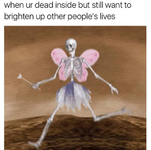|
|
| FAQ/Help |
| Calendar |
| Search |
|
#1
|
||||
|
||||
|
https://themighty.com/2016/08/what-p...n-should-know/
10 Things People With PTSD-Related Dissociation Should Know By Mary F. Contributor I have post-traumatic stress disorder (PTSD). For me, that means life is like living in a bubble. Nobody else can see the bubble but it’s always there, keeping a gap between me and the rest of the world. From the outside, all people can see is a happy, confident young woman with a great life and a happy family. What nobody sees is that inside that bubble is a terrified person who has experienced unbearable pain. Trauma is a funny thing. It rewires the brain so all thoughts and actions become controlled by fear. Other people will tell you there is nothing to fear, but your brain keeps you in that state of hypervigilance long after the traumatic situation has ended. Of course, nobody can function in that state for long and so eventually dissociation kicks in. Dissociation takes many forms, but for me, it means I am never truly “present.” There is always a part of my brain that is shut down. Some days, this means I have no concept of time. I will function on autopilot for hours or even days at a time, and nobody else is aware I am not thinking or feeling anything. When this happens there are subtle signs. I become withdrawn and forgetful, which to others can seem irritating or rude. Please, remember I cannot always control this. This is my brain’s way of keeping me alive and functioning. This happens because my brain has not realized the trauma is over and life is now about more than survival. For the most part, others will never see how dissociation affects my life. My experiences have taught me how to appear “well” and socially acceptable, but having people who love and support me is helping me to rewire my brain to understand a world that is safe. This is what I want the people out there affected by PTSD and dissociation to know: 1. It is OK to let dissociation win sometimes. Your brain needs a rest from the pain of living with trauma. It takes time to learn new coping skills. In the meantime, do what you need to stay safe and keep practicing. You will get there. 2. Your life is up to you. You deserve the chance to make choices for yourself and decide what you want your life to be. 3. Flashbacks are not a sign of weakness. They are your brain’s way of letting you know you need to deal with something. 4. Talk. Write. Draw. Do whatever you can to let the pain out because keeping it in will destroy you. 5. Everyone deserves to be heard. This is true despite what your brain may tell you. Keep talking until you find someone who will listen. It might take a while but never, ever give up. 6. We all have days where we want to give up. On these days, we want to run away or even end it all. Please, ask for help because you deserve it. 7. Relationships are hard. Trusting other people when you trust has been broken is even harder, but it is so worth it. Finding people who love you and want to take care of you is healing. 8. Dissociation does not make you crazy. It means your brain is incredibly clever because it has found a way to protect itself so you can survive. That makes you so strong! 9. Therapy can be terrifying. Opening up about so much pain can seem unbearable, but if you can find someone willing to take that path with you it is worth it. It’s OK to be scared and struggle. 10. You survived. You survived trauma. If you survived trauma, then you have it in you to survive the recovery. You don’t have to do it alone. Even if you have no family or friends, there are people out there willing to help, groups, websites, therapists and doctors. Keep going until you figure out what it is you need because you deserve to live a life free from your trauma. If you or someone you know needs help, visit our suicide prevention resources page. If you need support right now, call the Suicide Prevention Lifeline at 1-800-273-8255. You can reach the Crisis Text Line by texting “START” to 741-741.
__________________
 "Caught in the Quiet" |
Fuzzybear, MtnTime2896, Nammu, SoupDragon, ThisWayOut
|
|
#2
|
|||
|
|||
|
Thank you for sharing this.
|
Trace14
|
|
#3
|
||||
|
||||
|
Sure
 I hope it helps with others. When I read it I said yes! to many of the things listed. I hope it helps with others. When I read it I said yes! to many of the things listed.
__________________
 "Caught in the Quiet" |
|
#4
|
||||
|
||||
|
I really needed this. Thank you.
|
Trace14
|
|
#5
|
||||
|
||||
|
You are very welcome. I needed it as well.....and thought others might. We all share a lot of issues, questions, doubts, misunderstandings, wonders, thoughts, expectations and we want to be heard and understood. But first we have to understand it a little more ourselves. Articles like this help with that.
__________________
 "Caught in the Quiet" |
MtnTime2896
|
| Reply |
|
|